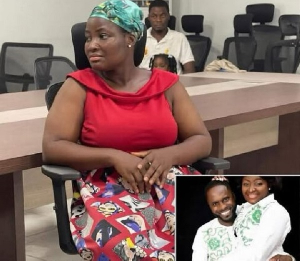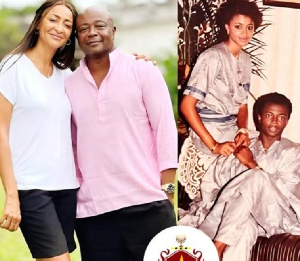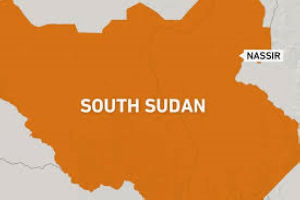A GNA feature by Beatrice Akua Asamani
Accra, May 10, GNA - After three decades of shuttling between Ghana and Botswana, Mrs Julia Sarkodie-Mensah could no longer stand the misconceptions held by citizens of the two countries about each other. In Botswana she heard people talking about Ghana as if it were an extension of Nigeria with its citizenry moving heaven and earth to exist, while in Ghana she heard people talking about Botswana as if it were part of South Africa, and only a desert.
Julia, therefore, felt that she was duty bound to set the records straight not only because she is Ghana's Honorary Consul in Gaborone, but also because she has a rich background as a Ghanaian-born attorney and entrepreneur, who has lived in Botswana for over 30 years. Consequently, a few years ago, Julia decided to bring citizens of the two countries, who are seven hours flight apart, much closer to understand each other better and to marry their economies.
A trade and investment exposition, she decided, was the best platform and she sought the approval of President Festus Mogae of Botswana and President John Agyekum Kufuor of Ghana. The two Presidents, she said, were both delighted, commended her and pledged their full support.
In due time, Ghana's Consulate, aided by the Ghanaian Association in Botswana, worked with the Botswana Export Development Authority (BEDIA) and Ghana's Ministry of Trade and Industry towards the realisation of the vision.
Under the theme: "Promoting Investment and Integration Through Trade and Culture," the objectives of the expo were set as follows:
- Promoting intra regional trade.
- Investment and cultural exchanges, primarily between Ghana and Botswana, and
- Extend the ties to embrace the 250 million people of ECOWAS and the 200 million people of the South African Development Community (SADC).
Activities for the expo were an exhibition to showcase export-oriented products of both countries, a seminar to discuss policy issues, tax regimes and incentives for investment and trade, cultural durbars to socialise and a dinner/dance to raise funds to support charities helping HIV/AIDS orphans and kids with the disease. For BEDIA, this expo was a fine novelty because it was the first bilateral trade and investment fair it was hosting. More importantly, it synchronised with its mandate to seek opportunities that would diversify and industrialise the country.
Ghana's Trade Ministry also saw the event as an opportunity to attract investments into the agro-processing and manufacturing sectors to promote development.
When Vice President Aliu Mahama opened the four-day exposition of May 4, he urged African countries to transform the rhetoric about trading among themselves into concrete action that would link their economies and improve their fortunes mutually.
Through intra-African trade and investments, the Vice President said, Africans would be able to process their raw materials, improve on their one per cent share of global trade and have the needed resources to deal with mass poverty and diseases on the Continent.
The Vice President was virtually proved right as Batswana (ed correct) who attended the fair fell in love with processed Ghanaian foods and purchased the "shito", chocolates, gari and groundnut paste in no time.
Exhibitors and participants from both sides agreed that there should be vigorous follow-up action to cement the relationships that had been forged.
Julia is very hopeful that the seed that had been sowed would bear abundant fruit if it were well nurtured.
But more importantly, she is cheery that Ghanaians have the opportunity to know Botswana better and learn and benefit from their experiences as a country with one of the highest economic growth rate in the world.
Now known as the land of diamonds and beef, Bechuanaland adopted the name Botswana after gaining independence from Britain on 30th September 1966.
It has enjoyed uninterrupted civilian rule since then with elections held every five years. President Mogae is the third President having succeeded Ketumile Masire in April 1998. Sir Ian Seretse Khama was the First President.
With an entrenched democratic culture, the incumbent political administration relates cordially with the opposition, which has reserved places for members to travel with the Government.
The nearly 1.7 millions citizens have the opportunity to express themselves through their representatives in their bi-cameral Parliament, which consists of a 61-member National Assembly and a 15-member House of Chiefs.
Additionally, they can find free expression in the media, which include over 25 radio stations and a Ministry of Information-published daily, distributed free of charge. They also have a Freedom Square where those who do not want any technical or human intermediaries could stand and blow off their tops.
They, however, respect the rule of law, which is based on Roman-Dutch law and local customary law.
The reward for embracing discipline has been a well-planned and beautifully landscaped settlement with clean environment. Cleaning of the cities and the maintenance of infrastructure are done around the clock and nobody sells without a licence. About 54 per cent of the population live in urban areas. The indigenous citizens are called Batswana (plural.) The singular is Motswana. The predominant tribe is Setswana, which is also the national language. The official language is, however, English. Botswana, which is bordered by South Africa, Namibia and Zimbabwe, covers an area of 581,730 square kilometres. It is landlocked. Arable land is less than six per cent, while rainfall is very low. It has warm winters and hot summers with temperatures ranging between a high of 40 degrees Celsius and a low of five degrees Celsius. Botswana's natural resources include diamonds, copper, nickel, coal, salt, ash, gold, granite and wildlife.
But, it is diamonds, which have given the impetus to its sound economic management practices to transform its agro-based economy into one of the most prosperous in the world.
With three diamond mines, the country is by value the biggest diamond producer in the world with an annual output of 17 million carats. This accounts for more than 70 per of export earnings and 45 per cent of GDP. In 2004, the country, whose inflation rate is about seven per cent, recorded a GDP per capita income of 9,200 dollars. The foreign reserves, which can cover more than six months imports, is 5.7 billion dollars. The currency is called Pula, which is about 4.9 to one dollar.
Over the past few years the country has mounted an aggressive investment campaign that has attracted investors from South Africa, Taiwan, Portugal, Belgium, China, United Kingdom, Sweden and others to the manufacturing and industrial sectors.
Assembly of trucks, the manufacture of garments, motor vehicle springs, computer software development, polishing of diamonds and other minerals, engineering products, leather goods and canned beef products are some of their products for the domestic and export markets.
With a corporate tax of 15 per cent, guaranteed land for investments and a banking sector that does not require collateral before granting loans to citizens, Botswana still seeks investments in textiles and garments, leather products, glass products, information technology, jewellery and tourism sectors.
The Government, after independence, took ownership of the land, which has been zoned for residential, agricultural, industrial and other purposes for lease to citizens and investors.
For so many years, Ghana has enjoyed excellent diplomatic ties with Botswana and its people love and respect Ghanaians as hardworking and lovely people.
The nation has benefited from Ghanaian expertise, especially in the educational sector, in its developmental efforts.
Currently, there are about 2,000 Ghanaians, mostly professionals and academicians, resident in Botswana.
Ghana is also training some Batswana at the University of Ghana Medical School as the country is in dire need of doctors to take care of its high population of HIV/AIDS victims (40 per cent). It is hoped that in the spirit of the New Partnership for African Development (NEPAD) the friendship would be more fruitful if they married their private sectors and pooled efforts to establish joint agro-business industries, which would provide Botswana with its agricultural needs and Ghana with technology and foreign exchange. Until this happens, Julia and her Ghanaian compatriots in Botswana believe that they have found a peaceful haven away from home and the citizens in both countries have at least learnt more about each other.
Opinions of Tuesday, 10 May 2005
Columnist: GNA














